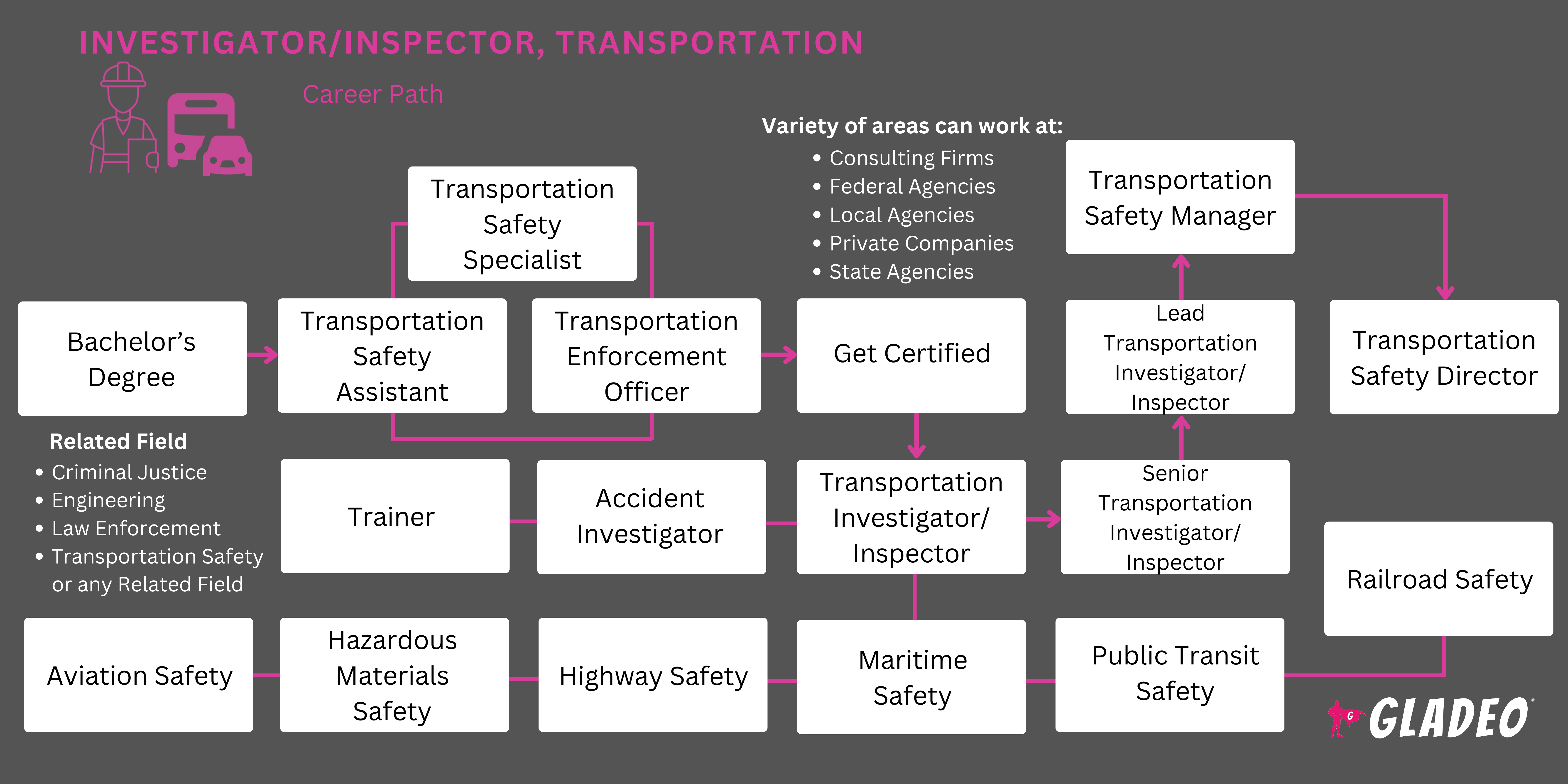스포트라이트
화물 조사관, 검사관, 해상 화물 조사관, 해상 조사관, 석유 검사관, 교통 안전 검사관, 규정 준수 조사관(교통), 규제 집행관(교통), 교통 규정 준수 검사관, 교통 규제 조사관, 교통 안전 준수 책임자, 차량 검사관(교통), 상업용 차량 안전 검사관
매일 약 4천만 톤의 화물이 트럭, 철도, 수로 선박을 통해 미국 내에서 이동합니다. 이러한 화물은 재고 추적, 올바른 제품 배송, 손상 여부 확인, 정확한 세금 및 관세 적용, 손실 방지 등 여러 가지 이유로 운송 검사관이 정기적으로 검사해야 합니다.
또한 위험 물질의 안전한 운송 절차를 확인하고 밀수 및 테러와 같은 불법 활동으로부터 공급망을 보호하기 위해 검사를 실시합니다.
교통 검사관은 일반적으로 교통부 및 주 정부 기관과 같은 정부 기관에 고용되지만 민간 기업에서도 근무할 수 있습니다. 이들은 연방항공청, 교통안전국, 세관 및 국경 보호국의 검사관과는 별개이지만 모두 비슷한 업무를 공유할 수 있습니다.
- 화물 및 승객의 안전한 운송 보장
- 운송 프로세스 효율성에 기여
- 범죄 행위 억제 및 적발
- 국가 공급망에서 필수적인 역할 수행
근무 일정
- 운송 검사관은 일반적으로 풀타임으로 근무하며 야간, 주말, 휴일 근무가 가능합니다.
일반적인 의무
- 화물 운송 능력을 결정하기 위한 서류 검토
- 화물 취급 장치 및 보관 시설 점검
- 화물을 컨테이너와 차량에 적재하고 고정하는 작업을 감독하여 관련 규정을 준수하는지 확인합니다.
- 발송물을 검사하여 깨지기 쉽고 위험하며 부패하기 쉬운 물품의 안전한 차단 및 보호 장치와 적절한 취급 여부를 확인합니다.
- 근로자에게 특별 취급 요건에 대해 알립니다.
- 부패하기 쉬운 제품이나 기타 온도 관리가 필요한 제품에 해당하는 경우 배송 및 보관 구역의 온도와 습도를 모니터링합니다.
- 차량에 적절한 위험 물질 경고 표지판 표시하기
- 경로를 따라 교량이나 터널을 통과할 수 있는지 확인하기 위해 하중을 측정합니다.
- 선박 수심 측정 및 규정 준수 인증서 발급
- 용기 안정성 계수 계산
- 도착 또는 하역 시 화물의 손상 여부를 육안으로 검사합니다.
- 검사 보고서 작성 및 제출
- 화물 상태 및 관찰된 문제에 대한 세부 정보 기록
- 검사 중 발견된 위반 사항에 대한 시정 조치 권고
추가 책임
- 팀원들과 효과적으로 커뮤니케이션
- 업계 규정 및 모범 사례에 대한 최신 정보
- 검사에 사용되는 모든 장비가 적절하게 유지 관리 및 보정되었는지 확인합니다.
소프트 스킬
- 분석
- 세부 사항에주의
- 통신
- 조정
- 디테일 지향
- 근면
- 평가 기술
- 독립
- 무결성
- 대인 관계 기술
- 관찰력
- 조직 기술
- 문제 해결
- 사실적인
- 시간 관리
기술 능력
- 차량, 화물, 화물 차단 및 브레이싱, 라벨링 및 적하목록 문서 검사 기능
- 차량 시스템(엔진, 브레이크, 서스펜션 시스템, 전기 부품 등)에 대한 기본적인 이해
- 전자 보고 시스템/차량관리 시스템에 익숙함
- 누수, 볼트 풀림 또는 타이어 마모와 같은 사소한 문제를 해결할 수 있습니다.
- 진단 도구(OBD-II 스캐너, 멀티미터, 브레이크 테스터) 사용 숙련도
- 연방 교통안전국(
), 교통부 및 기타 기관의 규정에 대한 지식 - 화물 취급 및 운송 기술에 대한 이해(예: 적절한 고정, 중량 분배 및 위험물 관리)
- 연방 및 주 정부 기관
- 운송 및 창고 회사
- 철도 운송 회사
- 배송 회사
- 화물 및 물류 회사
업무 특성상 많은 교통 검사관은 다양한 외부 환경에 노출되어 있습니다. 따라서 극심한 더위, 혹한의 추위 또는 그 사이의 모든 날씨에 맞설 준비가 되어 있어야 합니다. 예를 들어 하역장이나 항구 및 항만에서 일하는 경우 겨울철에는 빙판길에 주의해야 합니다.
어떤 조건에서든 검사관은 지름길을 택할 수 있는 사치를 누릴 수 없습니다. 안전 규정과 표준을 준수하기 위해 경계를 늦추지 않아야 합니다. 또한 좌절감을 느끼거나 서두르고 싶어 하는 화물 작업자들도 상대해야 합니다. 그렇기 때문에 검사관은 예의 바르고 전문적인 태도로 최선을 다하면서 자신의 입장을 고수할 수 있어야 합니다.
운송 업계에서는 안전과 효율성을 개선하기 위해 기술을 점점 더 많이 활용하고 있습니다. 예를 들어, 검사관은 이제 전자 문서 시스템을 사용하여 검사 결과의 기록과 추적을 간소화합니다.
공급망 자체는 실시간 데이터, 민첩성 향상, 예측 개선, 자동화 및 투명성 강화에 대한 증가하는 수요를 충족하기 위해 진화하고 있습니다.
지속 가능성도 우선 순위입니다. 검사관은 차량의 연비 및 배기가스 규정을 준수하는지 평가하고 화물 취급 시 환경 피해를 최소화하는지 확인합니다. 또한 가연성 리튬 이온 배터리가 포함된 전기 자동차를 검사하는 방법도 알고 있어야 합니다.
운송 검사관은 신뢰할 수 있고 독립적입니다. 세부 사항에 주의를 기울이고 문제를 해결하며 손으로 직접 작업하는 활동을 즐겼을 수 있습니다. 물류 관련 커리어에 적합한 '보이지 않는 곳'에서 일이 어떻게 돌아가는지에 관심이 많았을 것입니다!
- 운송 검사관은 고등학교 졸업장 또는 이와 동등한 학력이 필요하며, 운송 안전 및 규정에 대한 추가 교육이 필요합니다.
- 커뮤니티 칼리지 및 직업 학교는 교통 안전, 물류 및 관련 분야의 프로그램과 자격증을 제공합니다.
- 관련 코스 주제에는 다음이 포함될 수 있습니다:
- 화물 취급 및 적재
- 검사 기법
- 물류 및 공급망 관리
- 위험 관리
- 기술 보고서 작성
- 교통 안전 규정
- 물류, 공급망, 화물 및 운송과 관련된 견습직도 좋은 학습 방법이 될 수 있습니다.
- Apprenticeship.gov의 직종별 검색 기능을 확인하여 관련 옵션과 기회를 찾아보세요!
- 대부분의 직책은 추가적인 실무 교육이 필요합니다. 주별 라이선스 및 인증이 필요할 수도 있습니다.
- 자격증은 입사 지원자의 경쟁력을 높이는 데 도움이 될 수 있습니다. 인기 있는 자격증은 다음과 같습니다:
- 북미 운송 관리 협회 - 공인 화물 보안 전문가
- 대중교통 안전 및 보안 부서 - 대중교통 안전 및 보안 프로그램 인증서
- 학사 학위는 필요하지 않지만 커뮤니티 칼리지 또는 직업 학교 수업을 통해 해당 직무를 배울 수 있습니다.
- 운송 안전 및 물류 교육을 제공하고 협력 교육 체험과 같은 실습 교육을 제공하는 공인 교육 기관을 찾아보세요.
- 수업료 및 수수료 비용 비교, 주 내 비용과 타주 비용에 유의하세요.
- 장학금 및 재정 지원 옵션 검토
- 프로그램을 수료한 학생의 취업 통계를 확인하세요.
- 연방 정부 보조금인 펠 그랜트를 신청하는 경우, 해당 금액이 관심 있는 특정 학교의 등록금을 지불하는 데 사용할 수 있는지 확인하세요.
- 재향 군인은 현장 재향 군인 혜택 전문가와 함께 군인 친화적인 학교를 찾을 수 있습니다.
- 고등학교 수학 및 물리 수업은 유용합니다. 학교에서 자동차 기술 관련 수업을 제공하는 경우 해당 수업도 수강하는 것이 좋습니다.
- 공급망, 물류, 화물 취급 및 기타 운송 업무와 관련된 아르바이트 또는 수습직을 통해 실무 경험을 쌓으세요.
- 물류, 공급망, 화물 또는 운송 분야의 자격증 또는 준학사 학위 프로그램에 등록합니다.
- 현업에 종사하는 전문가들과 네트워크를 형성하세요. 그들의 커리어 경로에 대해 이야기하기
- 업계 동향, 특히 새로운 기술에 대해 알아보세요.
- 운송 검사에 관한 YouTube 동영상 시청 및 기사 읽기

- 검사관으로 취업하려면 먼저 관련 업무 경험을 쌓은 후 승진을 해야 할 수 있습니다.
- ZipRecruiter, SimplyHired, Indeed, Monster, Glassdoor와 같은 사이트에서 채용 광고를 검토합니다.
- 초급 직책을 살펴보세요. 교육 및 경력 요건을 충족하는지 확인하세요.
- 이력서 템플릿을 검토합니다. 다음과 같은 구인 광고의 키워드를 사용하여 이력서에서 관련 기술을 강조하세요:
- 규정 준수
- 안전 검사
- 차량 검사
- 위험 물질 취급
- 교통부 규정
- 위험 평가
- 사고 조사
- 예방적 유지 관리
- 규정 준수 감사
- 검사 보고서
- 전문가 네트워크에 있는 사람들에게 채용 정보에 대한 조언을 구하세요.
- 학교가 보유한 업계 인맥이나 예정된 취업 박람회에 대해 학교 측에 문의하세요.
- 이전 지도교수나 교수에게 추천서를 요청합니다. 연락처 정보를 제공하기 전에 허락을 받습니다.
- 일반적인 면접 질문을 조사하고 모의 면접을 통해 답변을 연습하여 면접에 대비하세요.
- 친구나 학교의 커리어 센터에서 모의 면접을 해보세요.
- 면접을 위한 전문성 있는 복장
- 적절한 시기가 되면 상사에게 성장 기회에 관심이 있음을 알리세요. 먼저 채용된 직무에 집중하고 배우고 발전하려는 의지를 공유하세요.
- 업무를 숙달한 후 더 많은 것을 배우세요! 고급 과정을 수강하거나 공인 화물 보안 전문가 또는 운송 안전 및 보안 프로그램 자격증과 같은 전문 자격증을 취득하세요.
- 다운타임을 활용하여 규정을 공부하고 새로운 기술에 대해 알아보기
- 다른 사람들을 적절하게 훈련시키세요, 왜냐하면 그들이 실수를 하면, 그것은 당신이 그들에게 준 훈련에 다시 반영되기 때문입니다.
- 항상 안전과 규정 준수를 강조하세요. 정직성을 갖춘 리더가 되어 기준을 높게 설정하세요!
- 신뢰할 수 있고 일을 제대로 처리하는 사람이라는 평판을 얻으세요.
- 미국 운송 및 물류 협회와 같은 전문 단체에 가입하세요.
웹사이트
- 미국 주 고속도로 및 교통 공무원 협회
- 미국 대중 교통 협회
- 미국 운송 및 물류 협회
- 연방 자동차 운송업체 안전 관리국
- 교통 공학 연구소
- 국제 운송 규제 기관 협회
- 전국 철도 안전 컨설턴트 및 조사관 협회
- 전국 학생 교통 서비스 주지사 협회
- 국가 안전 위원회
- 교통 연구 위원회
책
- 물류에 대한 실용적인 가이드: 운송, 창고 및 유통 입문, Jerry Rudd 작성
- 연방 자동차 운송업체 안전 규정 포켓북, J.J. 켈러 저
- 위험 물질 규정 준수 포켓북, J.J. 켈러 저
- 복합 물류 및 운송: 친환경적이고 효과적이며 지속 가능한 공급망의 미래로서의 멀티모달, 작성자: Arthur Wilson
운송 검사관은 운송 업계에서 안전과 규정 준수를 보장하는 데 매우 중요하지만, 이 직업을 얻기까지 시간이 오래 걸릴 수 있습니다. 유사한 직종에 관심이 있다면 다음 옵션을 살펴보세요:
- 항공기 화물 취급 감독자
- 비행장 운영 전문가
- 화물 및 화물 에이전트
- 건설 및 건축 검사관
- 건설 장비 운영자
- 배달 트럭 운전사
- 자재 이동 기계 및 차량 운영자의 일선 감독자
- 대형 및 트랙터 트레일러 트럭 운전사
- 철도 작업자
- 수상 운송 작업자
뉴스 피드

주요 채용 정보

온라인 과정 및 도구







